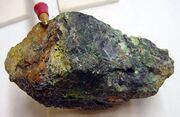Difference between revisions of "Argentite"
Jump to navigation
Jump to search

| (One intermediate revision by the same user not shown) | |||
| Line 1: | Line 1: | ||
| + | [[File:Argentite Wiki.jpg|thumb| Argentite, Image credit: Andrew Silver, [https://commons.wikimedia.org/wiki/File:Argentite.jpg Wikipedia]]] | ||
== Description == | == Description == | ||
| Line 23: | Line 24: | ||
|- | |- | ||
! scope="row"| Density | ! scope="row"| Density | ||
| − | | 7.2-7. | + | | 7.2-7.4 g/ml |
|} | |} | ||
Latest revision as of 10:03, 8 December 2022

Argentite, Image credit: Andrew Silver, Wikipedia
Description
A Silver sulfide mineral that is the most abundant ore of Silver. Argentite is mined in the U.S. (Nevada, Colorado, Montana), Mexico, Chile, Germany (Saxony), and Canada. Argentite is an opaque dark gray or black mineral with a lustrous metallic surface. It can be cut like wax with a steel knife. Argentite can also be found as a corrosion product on silver.
Synonyms and Related Terms
argentite (Fr., Port.); argentita (Esp.); Argentit (Deut.); argentiet (Ned.)
Physical and Chemical Properties
- Soluble in nitric acid.
- Crystallizes in cubes, octahedrons, dodecahedrons, and aggregates.
- Luster = metallic.
- Streak = gray.
| Composition | Ag2S |
|---|---|
| Mohs Hardness | 2.0 - 2.5 |
| Density | 7.2-7.4 g/ml |
Resources and Citations
- Mindat.org: argentite
- Van Nostrand's Scientific Encyclopedia, Douglas M. Considine (ed.), Van Nostrand Reinhold, New York, 1976
- Random House, Webster's Encyclopedic Unabridged Dictionary of the English Language, Grammercy Book, New York, 1997
- The American Heritage Dictionary or Encarta, via Microsoft Bookshelf 98, Microsoft Corp., 1998
- Richard S. Lewis, Hawley's Condensed Chemical Dictionary, Van Nostrand Reinhold, New York, 10th ed., 1993
- G.S.Brady, Materials Handbook, McGraw-Hill Book Co., New York, 1971 Comment: p. 67
- Dictionary of Building Preservation, Ward Bucher, ed., John Wiley & Sons, Inc., New York City, 1996
- Susan E. Schur, Conservation Terminology: A review of Past & Current Nomenclature of Materials, Technology and Conservation, Spring (p.34-39); Summer (p.35-38); Fall (p.25-36), 1985